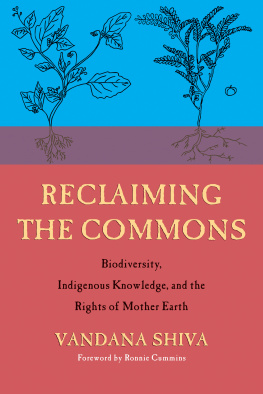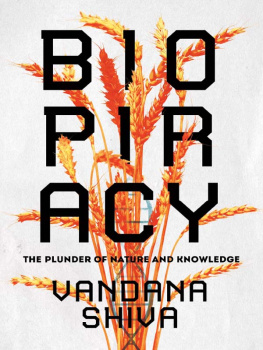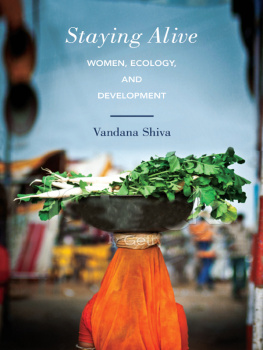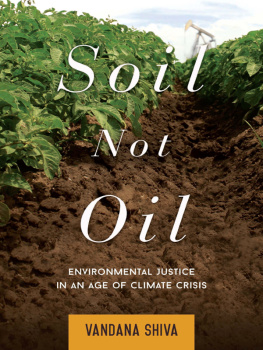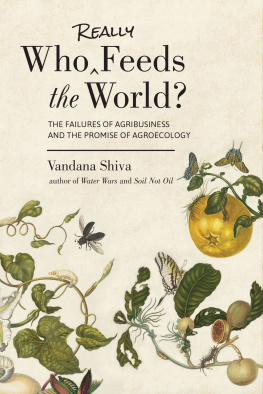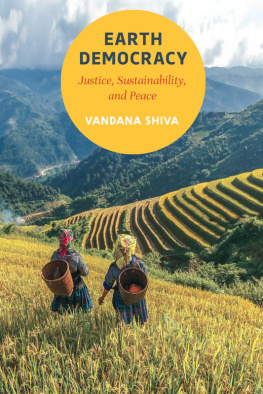Vandana Shiva - Stolen Harvest: The Hijacking of the Global Food Supply
Here you can read online Vandana Shiva - Stolen Harvest: The Hijacking of the Global Food Supply full text of the book (entire story) in english for free. Download pdf and epub, get meaning, cover and reviews about this ebook. year: 0, genre: Science. Description of the work, (preface) as well as reviews are available. Best literature library LitArk.com created for fans of good reading and offers a wide selection of genres:
Romance novel
Science fiction
Adventure
Detective
Science
History
Home and family
Prose
Art
Politics
Computer
Non-fiction
Religion
Business
Children
Humor
Choose a favorite category and find really read worthwhile books. Enjoy immersion in the world of imagination, feel the emotions of the characters or learn something new for yourself, make an fascinating discovery.

- Book:Stolen Harvest: The Hijacking of the Global Food Supply
- Author:
- Genre:
- Year:0
- Rating:3 / 5
- Favourites:Add to favourites
- Your mark:
- 60
- 1
- 2
- 3
- 4
- 5
Stolen Harvest: The Hijacking of the Global Food Supply: summary, description and annotation
We offer to read an annotation, description, summary or preface (depends on what the author of the book "Stolen Harvest: The Hijacking of the Global Food Supply" wrote himself). If you haven't found the necessary information about the book — write in the comments, we will try to find it.
Stolen Harvest: The Hijacking of the Global Food Supply — read online for free the complete book (whole text) full work
Below is the text of the book, divided by pages. System saving the place of the last page read, allows you to conveniently read the book "Stolen Harvest: The Hijacking of the Global Food Supply" online for free, without having to search again every time where you left off. Put a bookmark, and you can go to the page where you finished reading at any time.
Font size:
Interval:
Bookmark:

STOLEN
Harvest
TheHIJACKINGof the
GLOBAL FOOD SUPPLY
byVANDANA SHIVA

Copyright 2016 by Vandana Shiva
Published by the University Press of Kentucky
Scholarly publisher for the Commonwealth, serving Bellarmine University, Berea College, Centre College of Kentucky, Eastern Kentucky University, The Filson Historical Society, Georgetown College, Kentucky Historical Society, Kentucky State Uninversity, Morehead State University, Murray State University, Northern Kentucky University, Transylvania University, University of Kentucky, University of Louisville, and Western Kentucky University
All rights reserved.
Editorial and Sales Offices: The University Press of Kentucky
663 S. Limestone St., Lexington, Kentucky 40508-4008
www.kentucypress.com
The Library of Congress has cataloged the South End Press edition as follows:
Shiva, Vandana
Stolen harvest : the hijacking of the global food supply / by Vandana Shiva.
p. cm.
Includes index
ISBN 0-89608-608-9 (cloth : alk. Paper) ISBN 0-89608-607-0 (pbk. : alk. paper)
1. Food industry and trade. 2. Big Business. 3. Food supply. I. Title.
HD9000.5 .S454 1999
338.47664dc21
99-016814
ISBN 978-0-8131-6655-1 (pbk.: alk. paper)
This book is printed on acid-free paper meeting the requirements of the American National Standard for Permanence in Paper for Printed Library Materials.

| Members of the Association of |
Over the past two decades every issue I have been engaged in as an ecological activist and organic intellectual has revealed that what the industrial economy calls growth is really a form of theft from nature and people.
It is true that cutting down forests or converting natural forests into monocultures of pine and eucalyptus for industrial raw material generates revenues and growth. But this growth is based on robbing the forest of its biodiversity and its capacity to conserve soil and water. This growth is based on robbing forest communities of their sources of food, fodder, fuel, fiber, medicine, and security from floods and drought.
While most environmentalists can recognize that converting a natural forest into a monoculture is an impoverishment, many do not extend this insight to industrial agriculture. A corporate myth has been created, shared by most mainstream environmentalists and development organizations, that industrial agriculture is necessary to grow more food and reduce hunger. Many also assume that intensive, industrial agriculture saves resources and, therefore, saves species. But in agriculture as much as in forestry, the growth illusion hides theft from nature and the poor, masking the creation of scarcity as growth.
These thefts have only stepped up since the advent of the globalized economy. The completion of the Uruguay Round of the General Agreement on Tariffs and Trade (GATT) in 1994 and the establishment of the World Trade Organization (WTO) have institutionalized and legalized corporate growth based on harvests stolen from nature and people. The WTOs Trade Related Intellectual Property Rights Agreement criminalizes seed-saving and seed-sharing. The Agreement on Agriculture legalizes the dumping of genetically engineered foods on countries and criminalizes actions to protect the biological and cultural diversity on which diverse food systems are based.
The anti-globalization movement that started in response to GATT has grown tremendously, and I have been honored to have been part of it. My friends in the Third World Network, including Chakravarty Raghavan, and the tremendous people in the International Forum on Globalization have been a community of creativity and courage that has dared to challenge globalization at a time when history is supposed to have ended. Globally, we have seen the citizens movements against genetic engineering and corporate control over agriculture move concerns about genetic engineering from the fringe to the center stage of trade and economics. Whether at the St. Louis meeting on biodevastation or the Swiss or Austrian referenda on genetic engineering or the launch of the campaign for a Five Year Freeze on genetically engineered commerce in the United Kingdom, I have worked with some of the most courageous and creative people of our times who have taken on giant corporations and changed their fortunes. Corporations that have made governments their puppets and that have created instruments and institutions like the WTO for their own protection are now being held accountable to ordinary people.
TO SAVE THE STOLEN HARVEST
In 1987, the Dag Hammarskjld Foundation organized a meeting on biotechnology called Laws of Life. This watershed event identified the emerging issues of genetic engineering and patenting. The meeting made it clear that the giant chemical companies were repositioning themselves as life sciences companies, whose goal was to control agriculture through patents, genetic engineering, and mergers. At that meeting, I decided I would dedicate the next decade of my life to finding ways to prevent monopolies on life and living resources, both through resistance and by building creative alternatives.
The first step I took was to start Navdanya, a movement for saving seed, to protect biodiversity, and to keep seed and agriculture free of monopoly control. The Navdanya family has started 16 community seed banks in six states in India. Navdanya today has thousands of members who conserve biodiversity, practice chemical-free agriculture, and have taken a pledge to continue to save and share the seeds and biodiversity they have received as gifts from nature and their ancestors. Navdanyas commitment to saving seed means we cannot cooperate with patent laws, which make seed-saving a crime.
Seed patent laws, forced upon countries by WTO rules, are not the only way in which the resources of the Third World poor are being stolen to generate profits for giant corporations. In 1994, the coastal communities of India invited me to support their struggle against industrial shrimp farming, which was spreading like a cancer along Indias 7,000-kilometer coastline. The Jaganathans, an amazing Gandhian couple, had been leading a shrimp satyagraha, or non-violent direct action, to stop the devastation of coastal ecosystems and coastal communities. We joined forces with others like Bankey Behari Das of Orissa, Tom Kochery of Kerala, Jesurithinam of Tamil Nadu, Claude Alvares of Goa, and Jacob Dharmaraj in Andhra Pradesh to challenge the shrimp-farming industry in a case that was heard before the Supreme Court of India in 1996. While the court ruled in our favor, commercial interests continue to attempt to subvert its judgement.
In August 1998, I witnessed the destruction of Indias edible-oil economy by the imposition of soybean oil, a pattern being replayed in every sector of agriculture and the food economy. The womens movement and farmers movements resisted the imports of subsidized soybean oil to ensure that their livelihoods and their traditional food cultures were not destroyed. In so doing, they demonstrated that food free from genetic engineering is not a luxury for rich consumers. It is a basic element of the right to safe, accessible, and culturally appropriate food.
Next pageFont size:
Interval:
Bookmark:
Similar books «Stolen Harvest: The Hijacking of the Global Food Supply»
Look at similar books to Stolen Harvest: The Hijacking of the Global Food Supply. We have selected literature similar in name and meaning in the hope of providing readers with more options to find new, interesting, not yet read works.
Discussion, reviews of the book Stolen Harvest: The Hijacking of the Global Food Supply and just readers' own opinions. Leave your comments, write what you think about the work, its meaning or the main characters. Specify what exactly you liked and what you didn't like, and why you think so.

